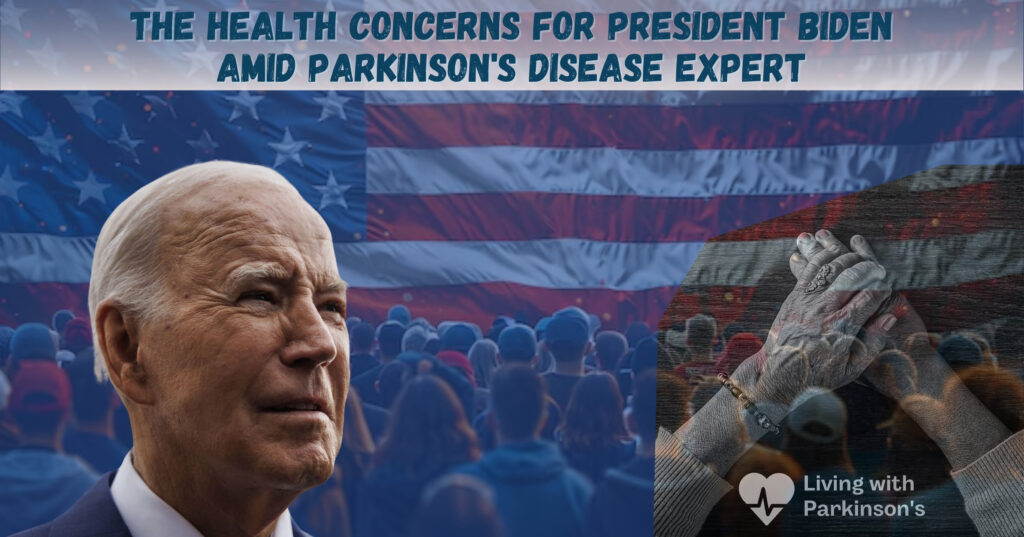Joe Biden Health Concerns and Parkinson’s Disease: A Growing Public Concern
Health concerns surrounding President Joe Biden have intensified amid reports of a top neurologist from Walter Reed National Military Medical Center visiting his physician earlier this year. Dr. Kevin Cannard, a renowned Parkinson’s disease expert, was spotted at the White House, raising questions about Biden’s health and fitness for a second term. This news has sparked widespread concern among US voters. Parkinson’s disease, which affects millions globally, leads to severe disability and requires comprehensive care and support. Awareness and early intervention are crucial in managing this progressive neurological disorder.

A caring hand on the shoulder of an elderly man, highlighting the importance of support and awareness for Parkinson's Disease.
Introduction
Concerns about President Joe Biden’s health have been a focal point during the ongoing US Presidential election campaign. Recent reports have intensified these concerns as news surfaced about a top neurologist from Walter Reed National Military Medical Center visiting Biden’s physician earlier this year. According to Fox News, Dr. Kevin Cannard, a renowned expert in Parkinson’s disease, made a discreet visit to the White House. This revelation has created a frenzy among US voters, raising questions about Biden’s fitness for a potential second term in office.
Key Facts About Parkinson’s Disease
Parkinson’s disease is a rapidly increasing cause of disability and death globally. Here are some critical facts about PD:
- Disability and Death: The number of people living with PD has more than doubled in the last 25 years. In 2019, PD was responsible for 329,000 deaths and 5.8 million disability-adjusted life years (DALYs), marking an 81% increase since 2000.
- Diagnosis and Treatment: PD can be clinically diagnosed by trained non-specialized healthcare workers. The most effective medication for PD, levodopa/carbidopa, is not accessible, available, or affordable everywhere, particularly in low- and middle-income countries (LMICs).
- Rehabilitation: Rehabilitation, including physiotherapy, can significantly improve the quality of life for people with PD.
Global Statistics and Impact
According to the World Health Organization (WHO), over 8.5 million people were living with PD in 2019. It is the fastest-growing neurological disorder worldwide. The disease affects movement, mental health, sleep, pain, and other health issues, progressively worsening over time.
Key Statistics:
- Prevalence: The prevalence of PD has doubled in the past 25 years.
- Disability and Death Rates: PD caused 329,000 deaths and 5.8 million DALYs in 2019, reflecting a significant increase over the past two decades.
- Geographic Distribution: China has the highest number of people with PD, with over half of the global PD population residing there.
Health Concerns in the Biden Campaign
The involvement of Dr. Kevin Cannard, a Parkinson’s disease expert, in Biden’s healthcare has led to speculation about the President’s health. This concern is not new; Biden’s age and health have been frequently discussed topics throughout his political career, particularly during his presidential campaigns.
Public Reaction and Media Coverage
The media, particularly Fox News, has highlighted Dr. Cannard’s visit, amplifying public concern. Social media platforms like Twitter have seen a surge in discussions, with trending hashtags reflecting both anxiety and speculation about Biden’s health. The public reaction has been mixed, with calls for transparency from the Biden administration and debates about the President’s ability to serve another term.
Understanding Parkinson’s Disease
Parkinson’s disease is a brain condition causing problems with movement, mental health, sleep, and other health issues. While there is no cure, therapies and medications can reduce symptoms. Common symptoms include tremors, muscle contractions, and difficulty speaking.
Symptoms of Parkinson’s Disease:
- Motor Symptoms: Slow movement, tremor, involuntary movement, rigidity, trouble walking, and imbalance.
- Non-Motor Symptoms: Cognitive impairment, mental health disorders, dementia, sleep disorders, pain, and sensory disturbances.
Treatment and Care
While there is no cure for Parkinson’s disease, various therapies, including medications, surgery, and rehabilitation, can alleviate symptoms. The most common medication is levodopa/carbidopa, which increases dopamine levels in the brain. Other treatments include anticholinergics to reduce involuntary muscle movement and deep brain stimulation for severe tremors.
Rehabilitation Therapies:
- Strength Training: Improves muscle strength and endurance.
- Gait and Balance Training: Helps with mobility and stability.
- Hydrotherapy: Uses water exercises to improve movement.
Impact on Families and Carers
Caring for a person with Parkinson’s disease can be overwhelming. Family members and friends often provide extensive care, facing physical, emotional, and financial pressures. Support from health, social, financial, and legal systems is crucial. The WHO’s iSupport programme for dementia offers valuable resources for carers.
Human Rights and Stigma
People with Parkinson’s disease often face stigma and discrimination, including unjust treatment in the workplace and lack of community participation opportunities. Misconceptions about PD being a contagious illness or a normal part of aging can create barriers to proper care.
WHO’s Response and Global Action Plan
In May 2022, the World Health Assembly endorsed the Intersectoral global action plan on epilepsy and other neurological disorders 2022–2031. This plan addresses challenges and gaps in providing care for people with neurological disorders, including PD. The WHO also released a technical brief titled “Parkinson’s disease: a public health approach,” outlining important intervention areas for PD.
Conclusion
The revelation of a Parkinson’s disease expert visiting President Biden’s physician has intensified public scrutiny of Biden’s health amid the presidential campaign. Understanding Parkinson’s disease and its impact is crucial for fostering awareness and support within society. As the global prevalence of PD continues to rise, addressing the challenges faced by those living with the disease and their carers remains a critical public health priority.





1 thought on “Joe Biden Health Concerns and Parkinson’s Disease: A Growing Public Concern”